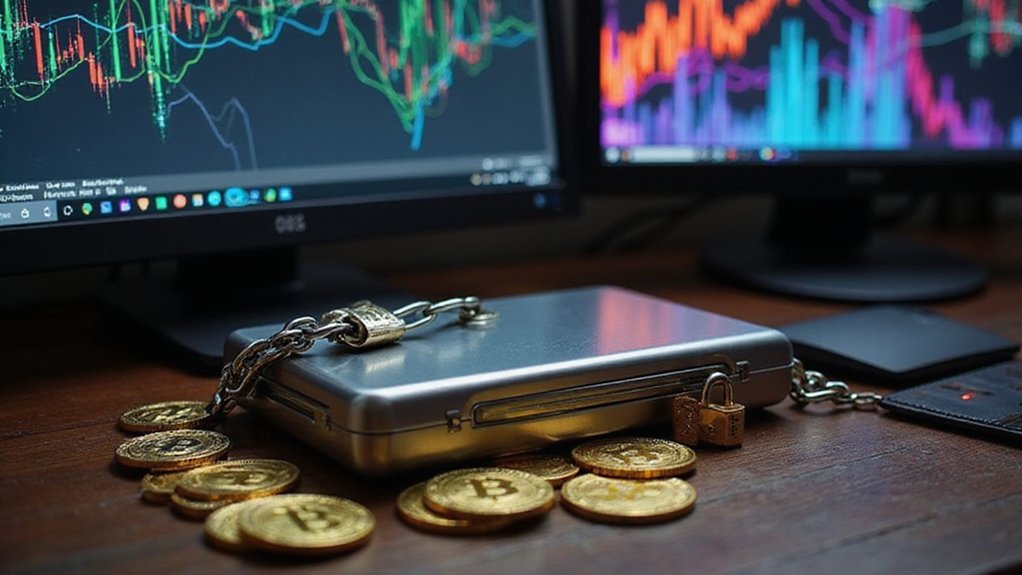Protecting against cryptocurrency scams requires a multi-layered defense strategy combining technological safeguards with psychological awareness. Users should store assets in hardware wallets or cold storage systems, implement multi-signature authentication, and maintain rigorous skepticism toward unsolicited investment opportunities—particularly those promising returns that would make ancient alchemists blush. While private key compromises account for 43.8% of thefts, verification of sender addresses and avoiding public Wi-Fi transactions greatly reduce exposure risks, though sophisticated threats continue evolving in ways that demand deeper understanding.

How exactly does one navigate the treacherous waters of cryptocurrency without falling prey to the elaborate schemes that have separated countless investors from their digital assets?
The answer lies in understanding that cryptocurrency scams have evolved into sophisticated operations that would make traditional con artists weep with envy.
Phishing scams represent the most pervasive threat, employing social engineering tactics that exploit human psychology rather than technological vulnerabilities.
Cryptocurrency thieves have mastered the art of psychological manipulation, making human nature their most effective hacking tool.
These schemes manifest through fraudulent emails, deceptive websites, and fabricated communications designed to harvest private keys and login credentials.
Verification of sender addresses and meticulous examination of URLs for irregularities—however minute—can distinguish legitimate correspondence from elaborate forgeries.
The cardinal rule remains inviolate: never share private keys or passwords under any circumstance, regardless of how convincing the request appears.
High-yield investment scams promise returns so astronomical they would make ancient alchemists blush, while pig butchering schemes involve extended grooming periods where scammers cultivate trust before executing their financial harvest.
The integration of artificial intelligence has elevated these operations to unprecedented levels of personalization, creating narratives so compelling they challenge even experienced investors’ skepticism.
Despite these evolving threats, overall illicit crypto volume actually declined by 24% in 2024, though this statistic should not diminish the need for continued vigilance.
Private key compromises accounted for 43.8% of stolen cryptocurrency in 2024, establishing it as the predominant theft vector—a statistic that should give pause to anyone storing digital assets on internet-connected devices.
Hardware wallets and cold storage solutions provide the most robust defense against such breaches, effectively removing private keys from network exposure.
Multi-signature wallets offer additional protection by requiring multiple authorization points for transactions.
The technical implementation of security measures extends beyond storage solutions.
Multi-factor authentication should be mandatory across all cryptocurrency-related accounts, while regular software updates patch vulnerabilities that hackers routinely exploit.
Public Wi-Fi networks present particular risks for cryptocurrency transactions, offering cybercriminals opportunities to intercept sensitive data.
Social media platforms have become breeding grounds for fraudulent investment opportunities, with scammers leveraging these channels to distribute misinformation and identify potential victims.
Scammers now create copycat tokens that deliberately mimic legitimate cryptocurrency projects to deceive unsuspecting investors.
Implementing two-factor authentication across all accounts significantly reduces the risk of unauthorized access even when credentials are compromised.
Blockchain intelligence tools continue reshaping crime prevention efforts, though the sophistication of criminal operations—particularly those attributed to state-sponsored actors—suggests that vigilance remains the investor’s most valuable asset in this digital financial frontier.
Frequently Asked Questions
What Should I Do if I’ve Already Fallen Victim to a Cryptocurrency Scam?
Victims should immediately report the incident to authorities (FBI’s IC3, CFTC) while meticulously documenting transaction records, communications, and wallet addresses—because apparently thorough paperwork becomes paramount after one’s digital assets vanish into the blockchain ether.
Avoid impulsive recovery attempts or suspicious “help” offers, which often constitute secondary scams.
Engage reputable recovery professionals cautiously, understanding that fund retrieval remains challenging despite blockchain’s supposed transparency and immutability promises.
Are Cryptocurrency Investments Through Social Media Influencers Always Scams?
Not invariably, though one might reasonably approach such endorsements with the skepticism typically reserved for carnival barkers.
While legitimate influencers occasionally promote viable projects, the sector’s Wild West atmosphere—where credentials remain mysteriously unverified and pump-and-dump schemes masquerade as investment advice—creates treacherous terrain.
The FBI’s documented 45% surge in crypto scam losses suggests that distinguishing authentic opportunities from elaborate theatrical performances requires considerably more due diligence than most investors anticipate.
How Can I Verify if a Cryptocurrency Exchange Is Legitimate?
Verifying exchange legitimacy requires examining regulatory compliance, operational history, and security practices.
One should investigate registration with financial authorities, review past security incidents, and assess KYC/AML adherence.
User feedback patterns reveal operational reliability, while leadership transparency indicates institutional maturity.
Multi-factor authentication requirements and audit reports demonstrate security commitment.
Given the industry’s propensity for spectacular failures, thorough due diligence remains essential—particularly scrutinizing proof-of-reserves and regulatory standing.
What Are the Warning Signs of Fake Cryptocurrency Wallet Apps?
Fake cryptocurrency wallet apps betray themselves through predictable patterns: absence of clear developer credentials, distribution via sketchy third-party platforms rather than legitimate app stores, and suspiciously minimal user reviews.
The most egregious red flag remains apps requesting direct entry of private keys or seed phrases—a practice legitimate wallets avoid through proper encryption protocols.
Excessive permission requests (why does a wallet need SMS access?) and unsolicited download prompts complete the scammer’s playbook.
Should I Report Cryptocurrency Scams to Law Enforcement Agencies?
Absolutely—one should report cryptocurrency scams to law enforcement agencies, particularly the FBI’s Internet Crime Complaint Center (IC3).
While recovering pilfered digital assets remains frustratingly elusive due to blockchain’s immutable nature, reporting serves broader investigative purposes.
These reports help authorities identify emerging fraud patterns, dismantle large-scale operations, and educate potential victims about evolving tactics.
Given that investment scams alone accounted for $3.9 billion in losses during 2023, collective reporting becomes essential intelligence.









